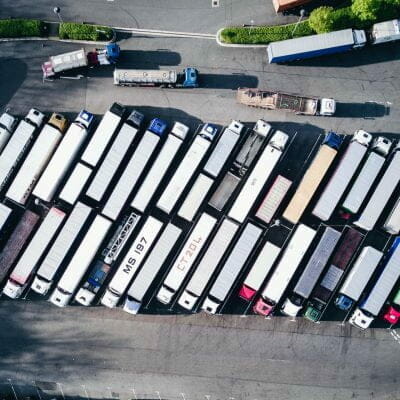Francesco Dionori, Director of Transport Networks & Logistics Division, Sustainable Transport Department of the UN Economic Commission for Europe (UNECE) answered questions about data on multimodal transport, waterways, road transport, and the future of sustainable transport for EKOIQ.
Interview: Burcu Genç
I would like to ask if UNECE has a future projection about the transport trends after COVID-19 in freight transportation in Europe? Intermodal transport can be an opportunity to reduce emissions by selecting cleaner options like waterways or railways?
UNECE gathers transport statistics on all inland transport modes and shares them on our website and in regular publications (1 & 2). The current COVID situation has made projections and forecasting of future patterns of transport flows very difficultly. In support of policymaking, we have also prepared a specific resource aimed at tracking COVID-19 related transport statistics (3). What we have seen from these sources is that, while road transport has been significantly affected by problems at borders, rail and intermodal freight, while lower, has been more resilient to the pandemic as discussed at our recent workshop on intermodal transport (4). In some of these cases, traffic has moved from road to freight because of these advantages, reversing the usual adage that rail is less reliable than the road. In this case, the fact that often train drivers and locomotives need to be changed at borders – often identified as one of the main things hindering the development of international rail – has meant that almost no new provisions were needed for cross border traffic. This, coupled with less passenger rail traffic overall, has to lead to an increase in the efficiency of intermodal rail freight.
It is important that this momentum is maintained to facilitate the further shift from road to more sustainable modes. Inland waterways have not as yet benefitted in the same way from the modal shift. More analysis is needed in this sector to identify the reasons for this.
UNECE is also working for promotion of the waterways. First I would like to ask if you have any research on Turkey about its waterways and do you have any suggestions for Turkey to promote waterways?
UNECE has been working on the regulatory framework for inland waterways for over 70 years. Many of the Conventions in this area are of great importance to the sector with some agreements having accession of over 75% of member States with navigable waterways. These Conventions and agreements, coupled with over 100 resolutions, have shaped the sector in everything from the registration of vessels to pollution, to signs and signals. Turkey is not a contracting party to any of the seven core Conventions on inland Navigation. Turkey also does not have any inland waterways identified in the European Agreement on Main Inland Waterways, the primary inland navigation agreement for the UNECE region, other than the coastal waterway, E-90 (and E-90-02), that touch Turkey.
As regards further expanding the use of inland waterways, our White paper on the Progress, Accomplishment and Future of Sustainable Inland Water Transport published at the beginning of the year highlights a number of key recommendations for the region as a whole:
- Increased coordination in the development of modern, sustainable and resilient E waterway network.
- Renewed focus in building up a solid regulatory framework aimed at increasing the efficiency and safety of inland water transport
- Identifying and applying strategies to increase the modal share of IWT, and improve its integration in multimodal transport and the logistics chains through the promotion of multimodality.
- Encouraging the modernization and greening of the fleet and infrastructure to better tackle environmental challenges.
- Promote the development and pan-European application of RIS and other information technologies.
- Promote the development of automation, digitalization and other innovations in the IWT sector.
- Address labour market challenges at the pan-European level, make the sector more attractive and increase the mobility of workers.
- Ensure safety, security and cybersecurity in IWT – Countering internal and external threats to the sector.
Road transportation can be sustainable? Roadways are being promoted by technologies like e-CMR as it reduces waiting at borders. But the roadways should still be an option for transport? And within this scope what does UNECE recommend to the governments to provide sustainable inland transport?
The share of road transport varies widely across countries. Amongst our 56 members States, 33 out of the 42 for which we have data see the share of road transport reach in freight is at or above 50% (see graph below). For passengers, road transport is at or above 80% in all countries with data. So clearly, road transport has to be part of the sustainability equation.
The digitalization of operations, which reduces waiting time at the border crossing and physical contact is a promising avenue. The Successful piloting of the digitalized “eTIR” system – such as between Turkey and the Islamic Republic of Iran or Turkey and Georgia – has demonstrated how it can enable a seamless operation of supply chains while reducing virus transmission risks by minimising physical contact between customs officers and truck drivers. UNECE is supporting the accelerated implementation of e-TIR. We are also promoting the use of “e-CMR” electronic consignment notes. 1 billion transport contracts are issued annually based on the CMR Convention that we administer, enabling seamless road freight.
More optimal use of intermodal transport is also key – see my answers above.
Another avenue is naturally a switch to greener fuels. From a normative perspective, the UN Vehicle Regulations that are developed under the World Forum for Harmonization of Vehicle Regulations that we host are technology-neutral and cater for the safe deployment of all types of fuels, including fuel cells.
The electrification of road transport is ahead of us. It will be a major challenge for countries and the transport industry, but will also bring opportunities. One of our recent studies showed that if 50 per cent of all vehicles manufactured were electric, 10 million additional jobs could be created worldwide, including 2.9 million in the UNECE region – in addition to the benefits in terms of reduced emissions. The same study also showed that almost 5 million new jobs could be created worldwide, – 2.5 million in the UNECE region – if UNECE countries doubled investment in public transport.
Finally, let’s not forget the human aspect of sustainability. With over 3,700 people losing their lives on the world’s roads every day, road transport cannot be considered sustainable. In fact, road crashes jeopardize the entire sustainable development agenda, costing developing countries between 2 and 5% of GDP per year, preventing vital investment in schools and universities, hospitals, access to water and sanitation and climate action. As the custodian of the UN Road safety conventions, we call on all countries to accede and implement them and to make road safety a priority.

Resource:https://www.unece.org/fileadmin/DAM/stats/publications/2020/SDG_report_for_web.pdf
Passenger traffic by mode of transport 2018, per cent

Carbon emissions are the primary consequence of the climate crisis. Also, air pollution has a bad impact on human and nature health. COVID-19 showed us that constant exposure to unhealthy air conditions causes more deaths and the coronavirus spread more widely. Transportation is one of the main emitters and has direct health effects. The PEP (Transport, Health and Environment Pan-European Programme) aims to link these causes and consequences with the partnership of UNECE and WHO. What are the main challenges, the earnings of the programme? Are there any plan to widen the programme globally as public health became the most important issue in the pos-COVID-19 world?
The Transport Health and Environment Pan-European Programme (THE PEP) is an initiative set up by member States of the UNECE and WHO to bring together these sectors to ensure “Green and healthy mobility and transport for livelihoods for all”. THE PEP has committed to five priority goals:
- Priority goal 1: To contribute to sustainable economic development and stimulate job creation through investment in the environment and health-friendly transport.
- Priority goal 2: To manage sustainable mobility and promote a more efficient transport system.
- Priority goal 3: To reduce emissions of transport-related greenhouse gases, air pollution and noise.
- Priority goal 4: To promote policies and action conducive to healthy and safe modes of transport.
- Priority goal 5: To integrate transport health and environmental objectives into urban and spatial planning policies.
THE PEP has been very successful in bringing together member States’ representatives from these diverse sectors to develop policy initiatives aimed at improving the sustainability of transport. Let me highlight a number of initiatives that have been pursued:
- Under the leadership of Austria, a partnership has been established to develop guidelines on eco-driving with the aim of making public and private road transport more efficient. In the testing phase, this has already provided some interesting results with savings of between 5-10% on fuel for trucks and buses and up to 20% for cars. The final guidelines will be published shortly.
- THE PEP has also sought to encourage the shift to electric mobility both in public and private transport. A further study that is about to be published provides good practice examples of how to optimise the provision of public transport, also in the use of electric mobility.
- To further facilitate the shift away from private car use, THE PEP has also worked extensively on mobility management initiatives. In this framework, a study has recently been published to present good practices in mobility management (5) highlighting a number of scenarios where significant reductions can be made in private car use with the use of appropriate incentives.
All these initiatives remain very relevant within the current COVID-19 pandemic situation. However, to further cement the central role of THE PEP in the development of sustainable transport, member States have decided to set up a special task force on the development of “Principles for green and healthy sustainable transport” (6). The aim of the principles will be to provide member States with guidance on how to reshape the transport sector, considering the current pandemic situation but also how best to create a better transport system for the future. Member States have already met three times in recent months and the principles are in the process of being developed with the aim of having recommendations ready for the end of 2020.
All these activities under THE PEP benefit from significant participation from member States, including from Turkey. While the programme itself is open to UNECE and WHO/Europe member States, which extend to Central Asia and North America, there is nothing stopping countries outside of the region taking up the recommendations that have been and will be developed.
This interview published in EKOIQ’s 90th volume (September-November).








